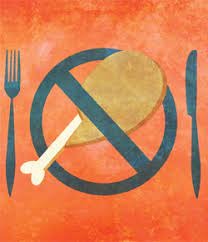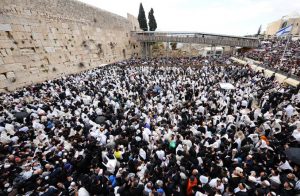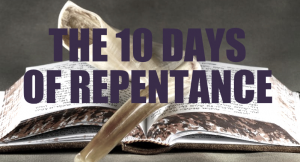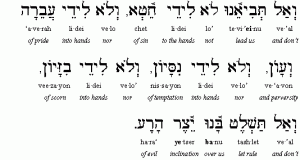Vayelech 2021: The Ever-Mighty Evil Inclination
by devadmin | September 9, 2021 9:50 pm
Raboyseyee and Ladies:
The Ever-Mighty Evil Inclination
We begin with good news. Moishe has already taught 611 of the 613 mitzvis contained in the entire heylige Toirah. With two to go, the entire parsha contains but 30 pisukim (verses). How 613 morphed into thousands more once our sages of the heylige Gemora came around -especially stuff that is verboten- and how the number of things ‘we cannot or should not do’ continues to increase with each generation of rabbis, ver veyst; all that for another day.
 The bottom line: welcome to Parshas Vayelech which is read -this year- as a singleton without its sister parsha of Netzovim. Lucky are those like the Ois’s brother Avi whose bar mitzvah coincided with this parsha. More good news: Should your child’s bar mitzvah fall on a shabbis with a much longer parsha, and he’s not terribly eager to study and then lain 100 plus pisukim, it’s not a terrible sin to change the bar mitzvah parsha to one of your choice. For a few dollars (make check payable to the Oisvorfer) a shorter parsha can easily be arranged. Does that always work? Not! Every once in a while, no matter how much one plans, the system gets you. So happens that the Ois’s oldest son, Zachary, was born on this very day -Tzoim Gidalya mamish- 30 years ago today. Happy birthday Zachmeister; you give nachas daily! For those who don’t know, and that would include many readers, today, Tzoim Gedalya, was, and still is a fast day: no eating or drinking permitted. The fast is named after this fellow named Gedalya. Who was Gedalya and why do we fast for him? Shoin, let’s not get very sidetracked but according to most, Gedalya was a Jewish governor who was assassinated. Seemingly Cuomo got off –if you chap- quite easily. Why we fast for Gedalya, ver veyst? More on him and reasons given for declaring a fast in his memory can be found on-line. Perhaps we ate too much over Yom Tov? The good news: though many other prominent Jews have sadly been assassinated, to date, he’s the only one for whom a fast was declared. Shoin.
The bottom line: welcome to Parshas Vayelech which is read -this year- as a singleton without its sister parsha of Netzovim. Lucky are those like the Ois’s brother Avi whose bar mitzvah coincided with this parsha. More good news: Should your child’s bar mitzvah fall on a shabbis with a much longer parsha, and he’s not terribly eager to study and then lain 100 plus pisukim, it’s not a terrible sin to change the bar mitzvah parsha to one of your choice. For a few dollars (make check payable to the Oisvorfer) a shorter parsha can easily be arranged. Does that always work? Not! Every once in a while, no matter how much one plans, the system gets you. So happens that the Ois’s oldest son, Zachary, was born on this very day -Tzoim Gidalya mamish- 30 years ago today. Happy birthday Zachmeister; you give nachas daily! For those who don’t know, and that would include many readers, today, Tzoim Gedalya, was, and still is a fast day: no eating or drinking permitted. The fast is named after this fellow named Gedalya. Who was Gedalya and why do we fast for him? Shoin, let’s not get very sidetracked but according to most, Gedalya was a Jewish governor who was assassinated. Seemingly Cuomo got off –if you chap- quite easily. Why we fast for Gedalya, ver veyst? More on him and reasons given for declaring a fast in his memory can be found on-line. Perhaps we ate too much over Yom Tov? The good news: though many other prominent Jews have sadly been assassinated, to date, he’s the only one for whom a fast was declared. Shoin.

As fate would have it and for reasons that only the RBSO could arrange, being born on T’zom Gedalya 30 years ago meant that Zachary’s bar mitzvah parsha was going to be Parshas Ha’zenu with its 52 pisukim. Ober as a good chaver (let’s call him Baruch Singer) says in kimat every conversation we have), “the RBSO fert de velt” (the RBSO runs the world) and Zachary’s bar mitzvah was somehow pushed forward from Ha’azenu (3rd shortest parsha), to Noiach when it always rains and its 153 pisukim (top five longest in the entire heylige Toirah). Some say that General Eisenhower, was known to have said azoy: “planning is essential; all plans are useless!”
Though small in size, words, sentences and chapters, our parsha does contain the last two mitzvis Moishe will teach before he says a final goodbye and passes on. According to many, it’s Moishe’s birthday – the 7th day of the month of Adar as he speaks the words of the parsha. Some say Moishe was also born on that day. Is that so? Ver veyst? Birth certificates were not yet introduced. He does not go quietly. He has delivered, as stated above, 611 of the 613 mitzvis we are commanded to keep. And if we can’t keep them all, we should avada not violate the negative commandments. Toirah inspired entrepreneurs study them all carefully and continue to create business opportunities around them. The RBSO mistama had all this planned out; we are His Chosen people and avada He wasn’t going to give us the heylige Toirah without some reward in this world. The heylige Toirah is the best guidebook to business ever; so it has been since it was gifted to the Yiddin as a marriage present. It’s the gift that keeps on giving. Over the generations, Yiddin have figured out just how to exploit each and every mitzvah. And this week, with the final two mitzvis, 612 and 613, another group of Yiddin figured out how to make a parnoso.
Vayelech contains the mitzvah of Hakhel, # 612, along with the mitzvah for every Jew to reduce to writing ‘this shira’, #613. What’s Hakhale and what specific shira are we talking about? Nu, lommer lernin: Hakhale, as practiced in modern times is the mitzvah that takes place once every seven years, at the conclusion of the shmita year, during the Succis holiday over in Yirusholayim. Given that a shmita year just began in the past few days, we have seven years before we can perform this mitzvah. Based on the Toirah’s words, men, women and children are to gather – seemingly together, say it’s not so – and to hear a public reading of Sefer Devorim. In modern times, this mitzvah is practiced on the plaza near the Kotel (Western Wall) where tens of thousands of Yiddin gather for the largest social mixer known to man.

It’s a place where people find each other, make new friends, ask each other about their hotels, flights and other small talk. Boys ogle girls, people are squeezed in like sardines and in general, it’s a feel-good event. And so it’s taka been for decades. With the onset of corona however, sadly, many have not been able to perform this mitzvah in person, ober not to worry. It’s only a matter of time before another Toirah inspired entrepreneur finds a way -for a fee avada- to have his go-pro scan the crowd one by one and allow us to zoom in on the friend, family member or girl you find attractive, and exchange pleasantries. Some say that bidieved (in case of emergency), a regular I-Phone may also be substituted. Ober what taka is Hakhale? Seemingly Hakhale was intended to remind the Yiddin of their glorious history, the commandments they are to keep and the principles they must live by. Veyter.
The mitzvah to reduce the shira to writing has been interpreted as the writing of new Sifrei Toirah (new Toirah Scrolls) and we needn’t delve much further; all understand how many make a living from this mitzvah. From scribes to the party favors given out and many others, the writing, dedicating and all else associated with this mitzvah, amounts to very big business for many Yiddin: the RBSO is great!
Shoin, speaking of shorter parshas, efsher you’re klerring azoy: why taka are the parshas of Netzovim, Vayelich, and Ha’azuni (30, 40 and 52 pisukim respectively) so much shorter than the others? So far no one has suggested an answer ober by the time we were born, the die had been cast; parsha lengths had been established generations earlier. We can kler that this was intentional given that these parshas typically coincide with Rosh Hashono and Yom Kippur and the great minds that established the parshas had some rachmonis (mercy) on us and gave us a shtikel break from shul, ver veyst. Alternatively, they decided that since Yom Kippur was the super bowl of fund raising, that it was efsher better to shorten the parshas so that our rabbis could be home focusing on banking and other financial matters that are of critical importance to the operations of their shuls; avada we are talking about money. They do this by working for weeks in advance on their Kol Nidrei appeals where sinners and oisvorfs like yourselves feel mamish vulnerable, and where they have us hoodwinked into believing that the tzedoko we pledge that evening will somehow buy our way out of the mess we are in with the RBSO for errant behavior in the past year.
Raboyseyee, let’s not forget that tzedoko is but one ingredient of the three required to get a clean slate. Over Rosh Hashono and again on Yom Kippur, we will be chanting these the words U’sishuva, U’sifila and Utzedoko over and again. Seemingly we need all three and tzedoko seems to be the last.
 Raboyseyee, we are in the throes of the Aseres Yimay Tshuva (ten days of repentance), and Yom Kippur – the super bowl of forgiveness is right around the corner. In fact, this shabbis is also known as Shabbis Shuva; it’s time. We have few days left to make amends with the RBSO for sins we committed during the past year, sins we plan to transgress as soon as the opportunity arises, if you chap, sins we had in mind to commit but didn’t (yet), for sins we committed intentionally and for those we plan still to chap areyn before the proverbial whistle blows at the end of Ne’ila. The big day is mamish around the corner. That being said, we are taught that the RBSO, knows how shelct (bad) you are and avada Knows that His Chosen people are a very difficult bunch to manage and control. Moreover, Moishe will make mention of just how bad we are and how bad we will be in the future in this very parsha. He was nebech right. Ober is it our fault? Maybe we can blame the RBSO? He did create us with a yetzer tov and a yetzer horo (good and evil inclinations) and it so happens that the yetzer tov He gave us is a lazy good for nothing who doesn’t exercise and is not physically fit.
Raboyseyee, we are in the throes of the Aseres Yimay Tshuva (ten days of repentance), and Yom Kippur – the super bowl of forgiveness is right around the corner. In fact, this shabbis is also known as Shabbis Shuva; it’s time. We have few days left to make amends with the RBSO for sins we committed during the past year, sins we plan to transgress as soon as the opportunity arises, if you chap, sins we had in mind to commit but didn’t (yet), for sins we committed intentionally and for those we plan still to chap areyn before the proverbial whistle blows at the end of Ne’ila. The big day is mamish around the corner. That being said, we are taught that the RBSO, knows how shelct (bad) you are and avada Knows that His Chosen people are a very difficult bunch to manage and control. Moreover, Moishe will make mention of just how bad we are and how bad we will be in the future in this very parsha. He was nebech right. Ober is it our fault? Maybe we can blame the RBSO? He did create us with a yetzer tov and a yetzer horo (good and evil inclinations) and it so happens that the yetzer tov He gave us is a lazy good for nothing who doesn’t exercise and is not physically fit.

Ober the yetzer hora is robust, in excellent shape and can take down the yetzer tov at any time. The yetzer horah exercises regularly, enjoys being vertical, if you chap- horizontal is also fine, and he outwits the yetzer tov 9.9 out of 10 times. He’s a genius! It’s mamish not a match.

Ober, we can take comfort in knowing that when He, the RBSO, selected us, it was by a process of elimination; seemingly, the other umois ho’oilom (the goyim) He rejected were mistama much worse. Is that even possible? Ober is it mamish our fault if that’s how the RBSO made us? Why He couldn’t give us a stronger yetzer tov, ver veyst? Ober, we remain His and the covenant – as Moishe told us just last week in Parshas Netzovim – cannot be permanently broken. Severely tested at times, efsher yes, ober broken, not! The RBSO does avada hide His face and also slaps us around from time to time, also as described in this week’s parsha, but is still willing to forgive on Yom Kippur, wipe the slate clean and start all over again. All we need to do is ask. Yom Kippur is a ‘kiss and make up day’ though avada kissing and making up, or out, are avada verboten that day. Seemingly, all we need to do is ask nicely. Having a shtikel kavona (sincerity) during davening would not hurt. Many say that going to the mikveh (ritual bathhouse) and dipping seven times with a few dozen other sinners helps set the tone for tshuva. It’s a shtikel pre-cleansing in advance of our davening. How visiting a community mikveh where some come to prey on the unsuspecting and many gather just to schmooze about stocks, helps cleanse the soul, ver veyst? And if that doesn’t work, avada you can chap a chicken – not the one you chap all year round, if you chap, and waive it over your head several times. Exactly what that does besides scare little kids and exactly how that helps transfer our sins to the poor unsuspecting chicken, ver veyst? Ober Raboyseyee, let’s not forget that tshuva is big business; one cannot interfere. These purveyors also need to make a living.
On the other hand, we also taught that the RBSO does not forgive -a dip in the mikveh notwithstanding- for sins we committed beyn-odom-lachaveroy (between man and fellow man), and especially so if the sins took place in the mikveh, if you chap. Shtekin abuse, if you chap, does not have a statute of limitations. Let’s also remember that Moishe will die before the day is over due to his own shtekin abuse and that was on a rock. Nu, imagine how upset the RBSO gets when one shtekin-abuses others to just get his rocks moved, if you chap. As for forgiveness for other sins between man and man, or man and woman, or man on someone else’s woman, if you chap, or woman on woman, we need to find the man or men, or the woman or women we somehow offended and ask them for mechila (individual forgiveness) especially if you were anywhere near the wrong mechila, if you chap. The RBSO, we are also taught does not appreciate clowns that ask His forgiveness yet won’t forgive their fellow man. It’s avada shver (challenging) to forgive. Avada you are pissed off and cannot get yourself to forgive them, ober think how pissed off the RBSO might be at you.
It’s taka emes, or might be, that someone taka wronged you, pissed you off; you are mad as hell, ober Raboyseyee, forgiveness is what the RBSO wants and if you want Him to forgive you and us- and OMG, do you and we need forgiveness- we need to be maver-al-midoisof (suck it up) and forgive others. Of course, you needn’t forgive unless the offender(s) make a serious effort to apologize and sees what they can do to negate any harm they may have caused you, whether inadvertent or even if not. Nor must you forgive the money they stole or borrowed and never repaid. The bottom line: forgiveness is free. Avada we can always forgive over Yom Kippur and resume normal anger the next day. Finding a reason and starting a new broiges (a new reason to be angry and not talk to one who pissed you off) following Yom Kippur is quite easy.
Nu, speaking of tshuva and forgiveness, it so happens that it’s not that difficult a process. Here’s how: Ershtens we begin by committing a few big chatoim (sins) and enjoying ourselves during the process. That’s the easy part, the part most of you have already accomplished. You’ve excelled. Then as Rosh Hashono, the ‘aseres yimay tshuva’ and Yom Kippur approach, with time running out mamish, we need to regret our wayward ways and ask the RBSO to forgive us. We need to promise to do better next year. On Yom Kippur day we will also klap a few hundred ‘al-cheyts’ (beat our chests) while we enumerate the various sins we likely committed. And if we wake up the next day, we all assume the RBSO listened to us, forgave us and wiped the slate clean.
And taka says the medrish (Yalkut Shimoine) azoy: Our chachomim (sages) asked the Novee (Prophet) what the proper punishment should be for a sinner. Said the Novee: death! Next they asked the heylige Toirah and the Toirah answered: let the sinner bring a korban (sacrifice). Finally they asked the RBSO and He answered: let the sinner do sincere tshuva and I will forgive him.
Ober sadly Raboyseyee, though many of you will taka do some tshuva on Yom Kippur, the reality is that many of you will go back to your wayward ways within days mamish. Some will begin by sinning immediately after leaving shul. It’s how the RBSO made us and azoy-iz-is (that’s just how it is). The RBSO chaps who we are with all our weaknesses and loves us anyway.
Shoin, the heylige Ois and eishes chayil take this opportunity to wish all readers -worldwide now -hundreds of thousands mamish- a great shabbis and an easy fast on Yom Kippur. May you all be inscribed for a great year ahead. May the RBSO taka forgive you and avada and avada the Ois as He has done for generations since He selected the Yiddin to be His Chosen people. We’re doing the best we can with the overgrown yetzer horo’s we have.
A gittin Shabbis,
The Heylige Oisvorfer Ruv
Yitz Grossman
Source URL: https://oisvorfer.com/vayelech-2021-the-ever-mighty-evil-inclination/